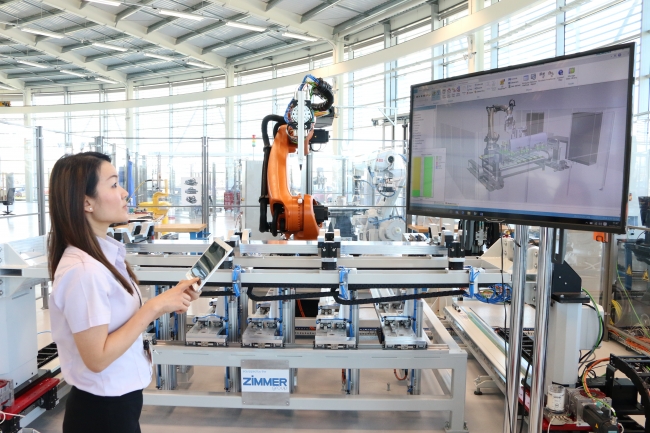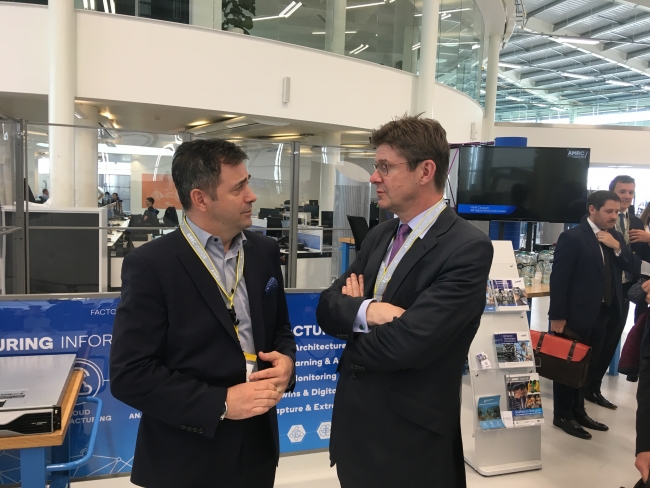5 minute read
New smart factory test bed facility opens at AMRC in Sheffield
The Secretary of State for Business, Energy and Industrial Strategy, Greg Clark, has opened the country’s first R&D test bed facility dedicated to helping UK manufacturing develop digital solutions to drive innovation and productivity in their companies.
He came to Factory 2050 in South Yorkshire to see how a powerful private sector consortium led by Rolls-Royce and Accenture – and drawn from the aerospace, automotive and pharmaceutical industries – has collaborated with the University of Sheffield AMRC to develop a connected facility that will de-risk investment in the digital technologies at the heart of the government’s Industrial Strategy and Made Smarter initiative.

The AMRC is a world-class centre for research into advanced manufacturing technologies used in the aerospace, automotive, medical and other high-value manufacturing sectors / Picture: AMRC
Mr Clark, and the Minister for Business and Industry, Andrew Stephenson, were given a tour of the connected smart factory test bed which included real time data streams from remote machining activities, smart assembly using intelligent work benches and augmented reality, visual inspection linked to artificial intelligence and a reconfigurable factory cell.
The test bed aims to show the significant opportunities of applying digital technologies to manufacturing with 50% productivity benefit, 30% reduction in defects and 50% improved time to market increasingly being demonstrated.
Secretary of State, Greg Clark, said: “From its two leading universities to the new Boeing factory, Sheffield has a bright future as a leader internationally for advanced manufacturing, innovation and R&D.
“The facilities at this first Smart Factory Test Bed will be a real asset to the city and the UK. Working with some of the UK strongest sectors – aerospace, automotive and pharmaceutical to provide insights into the future of digitally-connected manufacturing and showcasing how industry can use these technologies to transform productivity and performance
“This is our modern Industrial Strategy in action, with Made Smarter working directly with businesses on the ground to provide advice and support. Through Made Smarter and the Made Smarter Commission we’re working with leading figures from industry and academia to boost productivity and create thousands of new highly skilled jobs.
The founder and Executive Dean of the AMRC, Professor Keith Ridgway, added: “This open access test bed shows the power of digital, the power of collaboration, and the power of the North to drive the new economy. Working closely with one of the UK’s most innovative companies, Rolls-Royce, and with the innovation leaders at Accenture, the AMRC has created a facility where manufacturing companies, from global brands like Airbus to family firms like Footprint Tools, can come to de-risk the development of digital solutions that will drive innovation across their businesses.”
The University of Sheffield AMRC, which is part of the High Value Manufacturing Catapult, has laid the foundations for using connected, real time data to track the manufacturing lifecycle of components, from machining and inspection through to assembly using digital work instructions displayed through augmented reality.
Director of Global Manufacturing at Rolls-Royce Dr Hamid Mughal, said: “We’re proud to have played the lead industrial role in creating this unique capability. Today, there are many challenges in implementing digital in manufacturing at an industrial scale and pace with only a few real examples of ‘true’ Smart Factories providing seamless integration from the ‘Top floor to the Shop floor.’ The high total cost of implementation, lack of interoperability, high number of legacy assets plus concerns around cyber are major barriers to exploitation. We want to commoditise this technology and ultimately want this landscape to become both predictable and ‘economical’ for the OEMs and their supply chains. This testbed will provide an open, agnostic platform to explore, challenge, mature, exploit and ultimately accelerate transformational technologies in the wider UK manufacturing base.”

Secretary of State for Business, Energy and Industrial Strategy, Greg Clark and Juergen Maier at the launch of the smart factory test bed at the University of Sheffield AMRC / Picture: AMRC
Juergen Maier CBE, Siemens UK CEO and Made Smarter Co-Chair, praised the work of the consortium, concluding: “What we have seen here shows that industry and technology partners are getting on with the job of making the UK more productive and ready for a fourth industrial revolution. What is really exciting is that it is being led in Sheffield, by a real movement of companies of all sizes supported by innovation excellence from our Catapults. Our challenge is to spread the word and make sure manufacturers know about the potential of new digital technologies”
The Smart Factory test bed has been built on representative cyber and physical environments and provides a robust open agnostic innovation framework to explore, challenge, mature and exploit these rapidly evolving technologies. Working with both large and small-scale technology companies Industry can test and mature not only new technologies, but data strategies and new business models and promote common standards and interoperability.
What is the Smart Factory Testbed
The Smart factory test bed is the collaboration between Rolls Royce, Accenture and the AMRC. Rolls Royce providing the business leadership and Industrial demand/insight, Accenture the systems integration expertise and the AMRC the manufacturing process expertise and access to world class manufacturing facilities. The full consortium comprises Airbus UK; BAe Systems; Meggitt; Rolls-Royce; AMRC; GKN; Astra Zeneca; GSK; PFIZE, Nissan; and Marshalls
The opportunity
The test bed demonstrates the significant opportunities of applying digital technologies to manufacturing. 50% productivity benefit, 30% reduction in defects and 50% improved time to market are increasingly being demonstrate, and these are only set to increase through the exponential growth in disruptive technologies fuelled by the increase in computing power
The challenge
The application of these technologies at scale presents many challenges and in reality, there are few examples of Smart factories which provide full real-time data integration from the ‘shop floor to the top floor ‘. Where the application of digital technologies is driving improvement in factory uptime and flexibility using real time diagnostic and preventive maintenance information. Where process visibility is being provided to both on premise and remote team members whether this be senior leaders or supply chain partners. Where through the conversion of the data from information to knowledge is providing data driven insights and insights driven decisions.
The creation of an interconnected Smart Factory has many challenges, the lack of standards creates technical interoperability issues, cyber threats remain a key barrier to adoption, the high number of legacy assets limits data exploitation opportunities and the basic ability to manage and interrogate the huge growth in data.
How will the Smart Factory test bed help industry?
The Smart Factory Test Bed has been built on representative cyber and physical environments and provides a robust open agnostic innovation framework to explore, challenge, mature and exploit these rapidly evolving technologies. Working with both large and small-scale technology companies Industry can test and mature not only new technologies but data strategies and new business models and promote common standards and interoperability.

